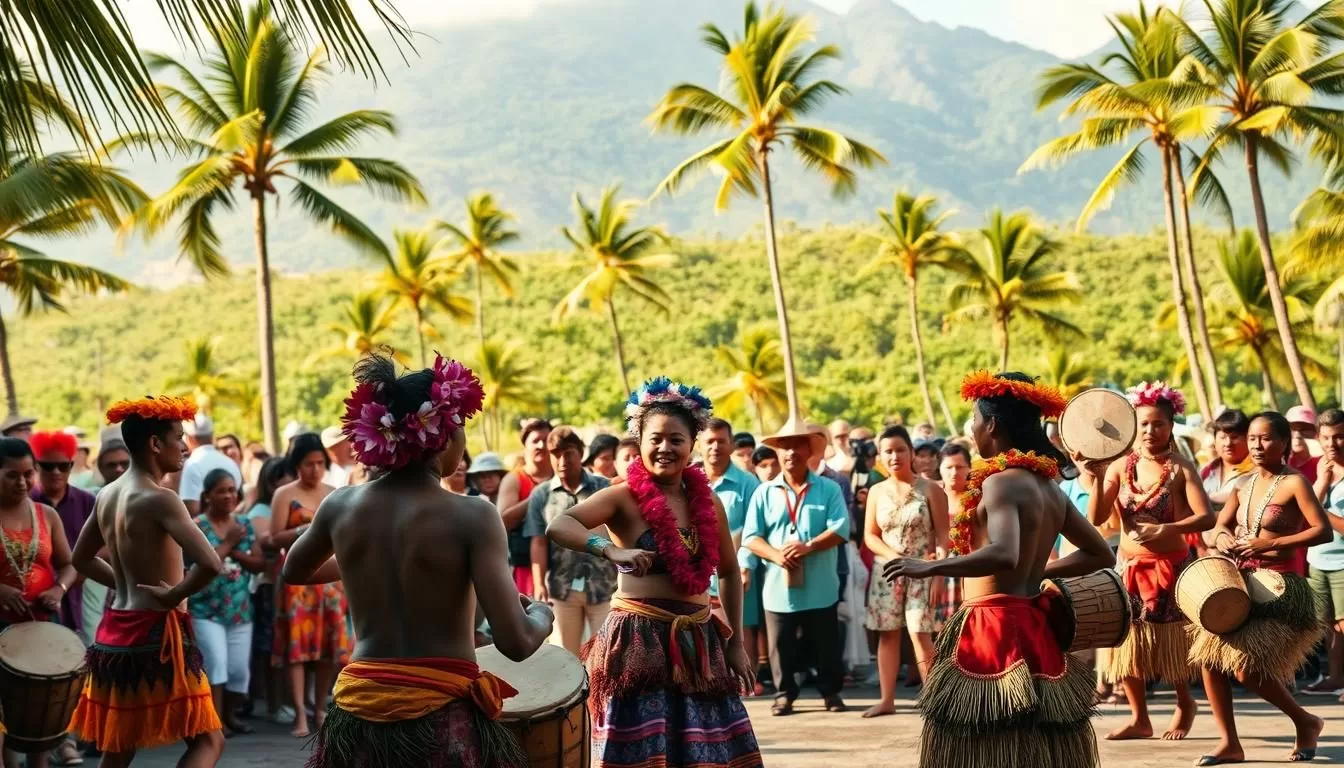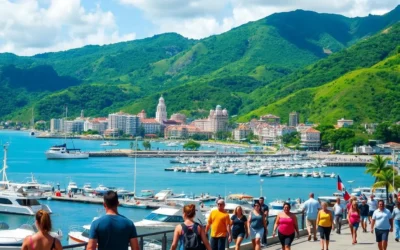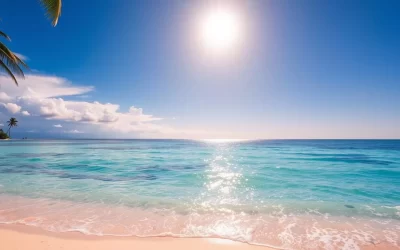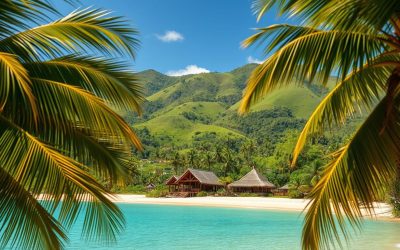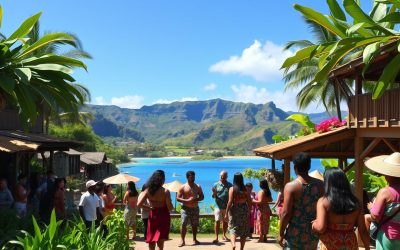Imagine immersing yourself in a vibrant culture that is rich in traditions and warm hospitality. Fiji’s festivals offer a unique window into the island nation’s heritage, making it a captivating destination for visitors.
Throughout the year, various events take place across different islands, each offering its own special experience and insight into Fijian way of life. By attending these festivals, you can engage with locals, taste authentic cuisine, and witness traditional performances.
Planning your trip around these events can transform your vacation into a rich cultural experience that creates lasting memories. Whether you’re looking to indulge in local customs or simply enjoy the festivities, Fiji’s festivals are sure to leave a lasting impression.
Discovering Fiji’s Vibrant Festival Scene
As you explore the islands of Fiji, you’ll discover a vibrant festival scene that reflects therich cultural heritageof the region. The festivals in Fiji are more than just celebrations—they’re vital expressions of the island’s culture and community values.
The Importance of Festivals in Fijian Society
Fiji’s festival scene is characterized by a blend of traditional rituals and modern celebrations, making it a unique experience for visitors. Some key aspects of Fijian festivals include:
- Festivals serving as living museums where ancient traditions blend with contemporary influences
- Diverse ethnic influences contributing to the vibrant tapestry of celebrations
- Music and dance being central elements, with traditional meke performances showcasing stories passed down through generations
- Communal nature of festivals highlighting the importance of togetherness in island culture
Therich cultural heritageof Fiji is on full display during these events, which bring communities together and offer visitors rare opportunities to witness authentic cultural expressions. By participating in thesecelebrations, you can gain a deeper understanding of Fijiancultureand the significance oftraditionsin the island’s daily life.
Understanding Fiji’s Cultural Tapestry
Understanding Fiji’s cultural heritage is crucial for appreciating its vibrant festivals. Fiji is home to a diverse array of traditional arts and crafts, which are prominently featured in local markets, especially during cultural festivals.
The Multicultural Influences on Fijian Celebrations
Fijian culture is a rich blend of various influences, creating a unique cultural identity. The indigenous Fijian culture forms the foundation of the nation’s heritage, with strong connections to land, sea, and ancestral traditions.
- The arrival of Indo-Fijians in the 19th century added a rich layer to the cultural landscape, bringing Hindu and Muslim traditions that are now integral to Fiji’s identity.
- Christianity also plays a significant role in modern Fijian culture, with many festivals incorporating religious elements alongside traditional practices.
- The concept of “vanua” (connection to land and community) is central to indigenous Fijian identity and influences how celebrations are conducted across the islands.
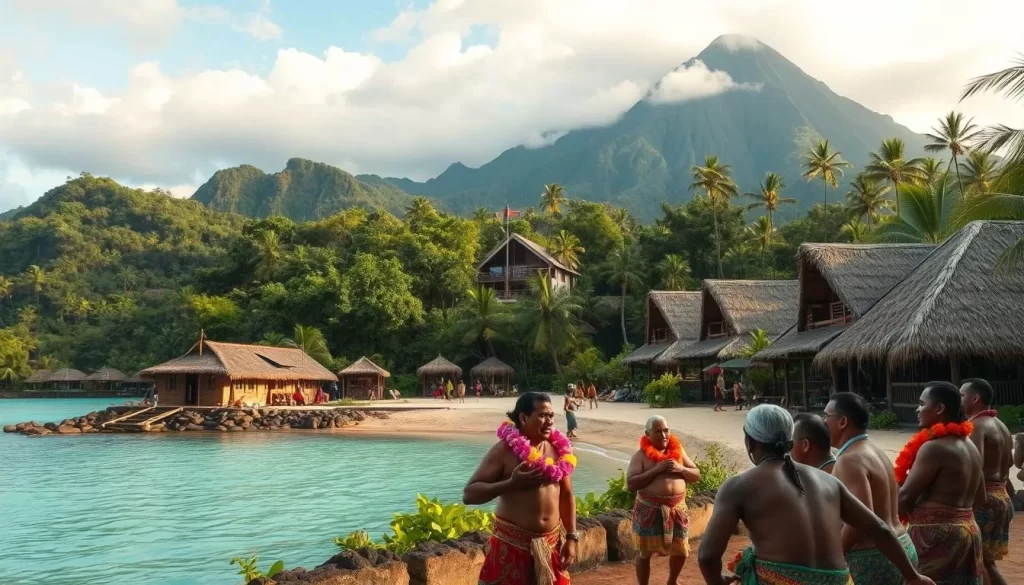
This multicultural cultural heritage is reflected in everything from festival foods to music, dance styles, and ceremonial practices, offering visitors a unique experience. By understanding this cultural tapestry, you can better appreciate the significance behind various festival rituals and ceremonies you might witness during your visit to this beautiful nation.
As you immerse yourself in Fijian life and way of life, you’ll discover how these diverse influences shape the people‘s celebrations and daily activities.
Bula Festival: Fiji’s Celebration of Community
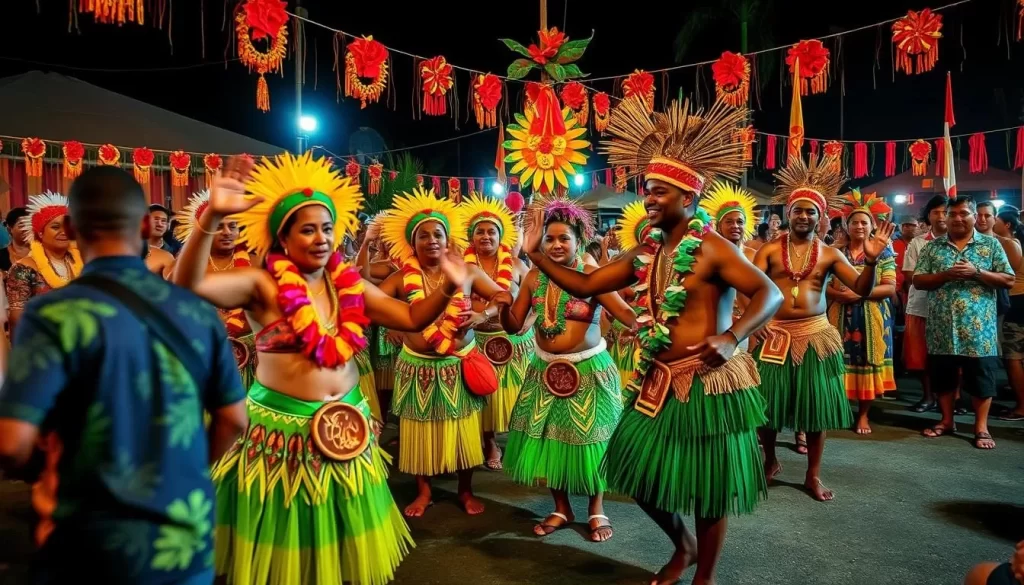
The Bula Festival is a vibrant celebration that embodies the spirit of community and welcome in Fiji. Held annually in July in the city of Nadi, this week-long event is a perfect introduction to Fijian hospitality.
“Bula” means “hello” or “welcome” in Fijian, reflecting the warm, welcoming spirit that Fiji is famous for worldwide. The festival began in 1960 as a small community event and has grown into a major celebration that attracts visitors from across Fiji and international tourists alike.
The History and Significance of Fiji’s Welcoming Festival
The Bula Festival is a mix of music, dance performances, and parades that showcase Fijian culture and contemporary life. Colorful parades featuring elaborate floats wind through Prince Charles Park, bringing locals and tourists together in the celebrations.
Local artists and craftspeople display their work throughout the festival, offering visitors a chance to purchase authentic Fijian art and handicrafts directly from creators. The festival culminates in the crowning of “Miss Bula,” a beauty pageant that celebrates not just physical beauty but contestants’ knowledge of Fijian culture and community service.
For visitors, the Bula Festival offers an ideal opportunity to experience the genuine warmth of Fijian community spirit while enjoying music, dance performances, and cultural displays. It’s a truly immersive experience that showcases the best of Fiji’s cultural heritage in Nadi during July.
Hibiscus Festival: Suva’s Premier Cultural Event
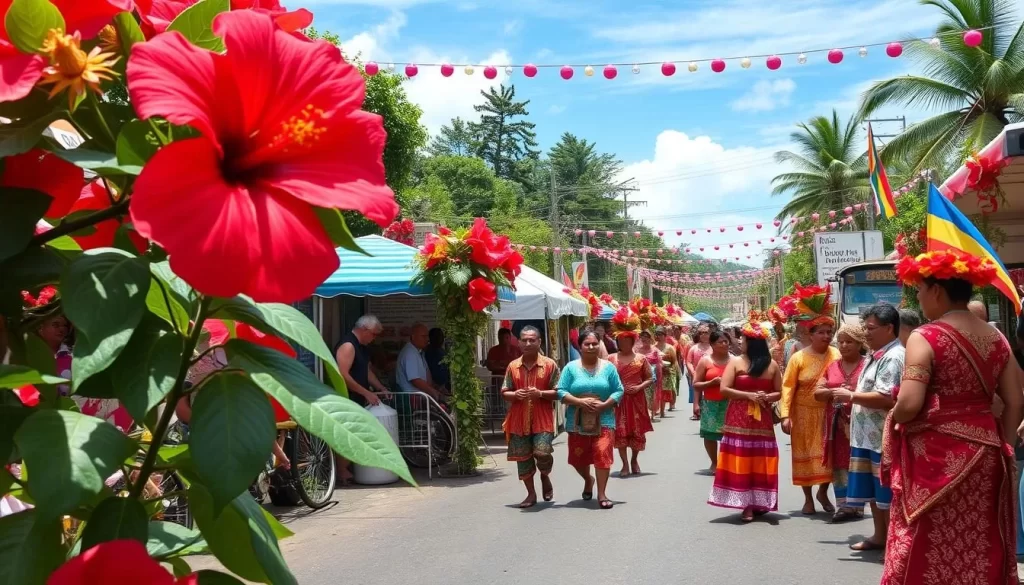
The Hibiscus Festival, held every August in Suva, is a spectacular showcase of Fijian arts, culture, and entertainment. As Fiji’s longest-running festival, it has become a premier cultural event since its inception in 1956.
A Celebration of Fijian Heritage
Originally established as a fundraiser for the Suva City Council, the festival has evolved into a week-long celebration that highlights the best of Fijian culture. The event transforms Suva’s Albert Park into a vibrant carnival atmosphere with rides, games, food stalls, and multiple stages for performances.
At the heart of the Hibiscus Festival is its famous beauty pageant, where contestants compete for the title of “Miss Hibiscus” while promoting social and environmental causes. Unlike typical beauty pageants, the competition emphasizes contestants’ knowledge of Fijian culture and commitment to community service.
Throughout the week, you can enjoy diverse performances ranging from traditional Fijian dances to contemporary music, reflecting the multicultural nature of modern Fiji. The festival includes competitions in various categories, celebrating Fijian heritage and providing a comprehensive introduction to Fijian urban culture.
Held annually in August in Suva, the Hibiscus Festival is a significant event that attracts over 100,000 visitors each year, making it the largest annual gathering in Fiji.
Diwali: The Festival of Lights in Fiji
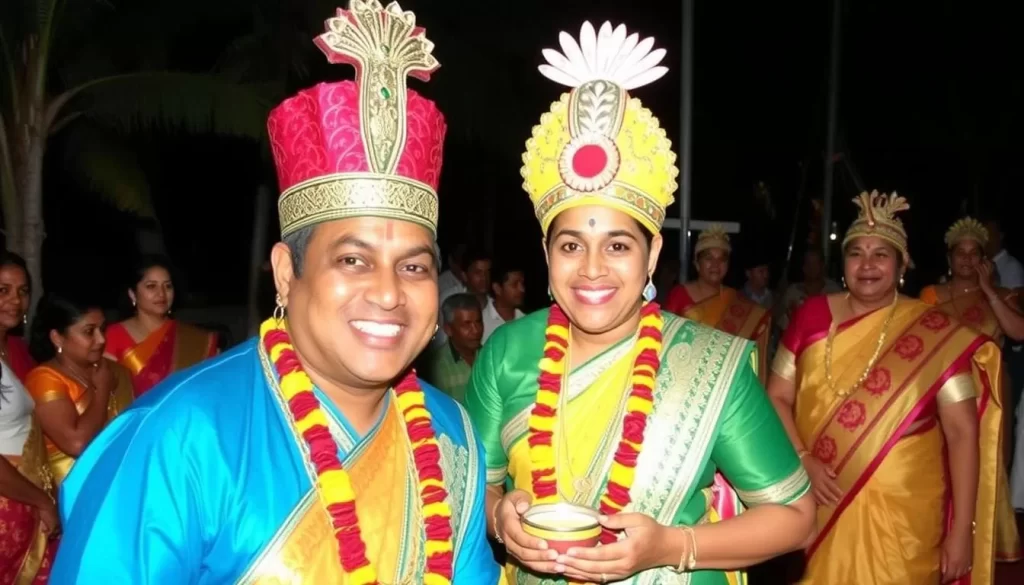
As Diwali approaches, Fiji transforms into a vibrant tapestry of lights and colors. This festival of lights is not just a celebration; it’s an experience that showcases the island’s rich cultural diversity.
Blending Traditions
The Diwali celebration in Fiji is a unique blend of Hindu traditions and Fijian culture. The significant Indian population in Fiji has made Diwali one of the main festivals celebrated here, alongside other communities.
The festivities are characterized by elaborate light displays, firecrackers, and community gatherings. Homes and businesses are adorned with festival lights, creating a magical atmosphere.
Diwali in Fiji is celebrated with great enthusiasm across the island, with Nadi and Nausori being key locations. The celebration is a testament to the country’s multicultural identity.
Unique Celebrations
- Diwali has become a national celebration, embracing Fijians of all backgrounds.
- The festival features larger-scale light shows and fireworks, blending tradition with modernity.
- Food plays a central role, with families preparing elaborate feasts that are often shared with neighbors.
- Cultural performances showcase the fusion of Indian and Fijian influences, creating unique artistic expressions.
For you, experiencing Diwali in Fiji offers a fascinating glimpse into the island’s harmonious cultural integration. It’s a time of joy, music, and dance, making it a memorable experience.
The best places to experience Diwali include Nadi, Lautoka, and Suva, where community events are organized throughout the festival period. Mark your calendars for the Diwali celebration each year, and get ready to be part of Fiji’s vibrant cultural tapestry.
Fiji Day: Celebrating National Pride
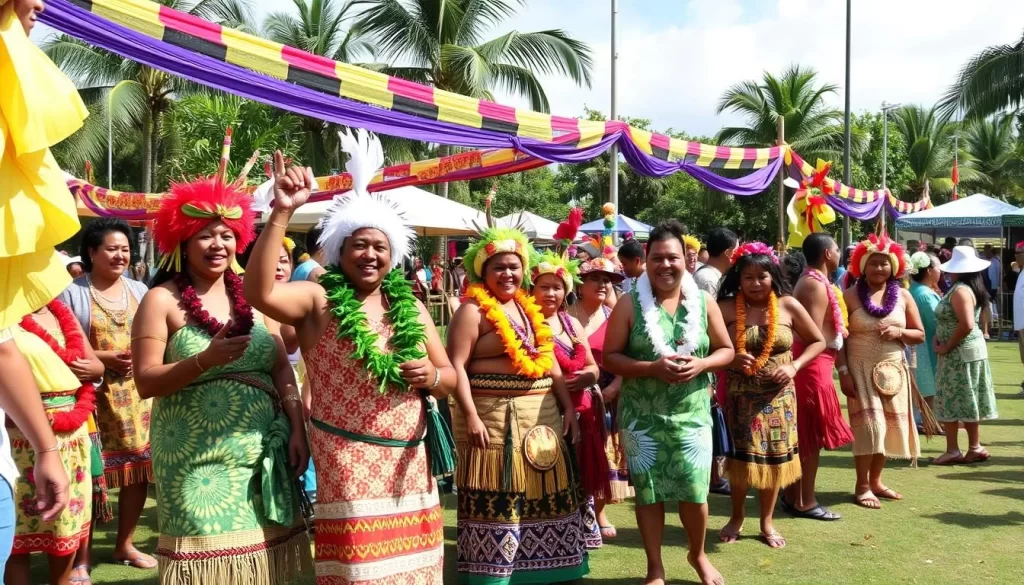
As the country takes pride in its history, Fiji Day is observed with enthusiasm across the islands. This significant event commemorates Fiji’s independence from British colonial rule, marking a crucial milestone in the nation’s journey.
Independence Day Festivities Across the Islands
Fiji Day, celebrated annually on October 10th, is one of the nation’s most important celebrations of national identity. The festivities extend throughout the week, known as Fiji Week, highlighting different aspects of the country’s history and cultural heritage.
The official celebrations include military parades, flag-raising ceremonies, and speeches by government officials, typically held in Suva and other major centers. What makes Fiji Day special is how national pride is celebrated in every village and community across the islands, with each area organizing local events that reflect their particular traditions.
Traditional ceremonies, including yaqona (kava) rituals, play an important role in connecting modern independence celebrations with ancient customs. For visitors, Fiji Day offers a rare opportunity to witness expressions of national pride that might not be visible during a typical vacation experience.
Festival of the Friendly North: Labasa’s Cultural Showcase

The Festival of the Friendly North in Labasa is a vibrant celebration that showcases the rich cultural heritage of Vanua Levu, Fiji’s second-largest island. Held annually in August, this festival is a testament to the community’s spirit and cultural pride.
Exploring Vanua Levu’s Premier Annual Celebration
This significant event transforms Subrail Park into a vibrant hub of activity, featuring cultural displays, agricultural exhibitions, and entertainment that reflects the region’s strong agricultural heritage. The festival serves a dual purpose: celebrating local culture while raising funds for community development projects in the Labasa area.
One of the festival’s highlights is its beauty pageant, where contestants represent different communities and compete for the “Miss Friendly North” title while promoting social causes. The event is a charitable occasion, with proceeds going directly to local projects, including improvements to healthcare facilities, schools, and public infrastructure.
For visitors, the Festival of the Friendly North offers a rare opportunity to experience Fiji away from the main tourist centers and engage with locals in a region fewer travelers visit. The festival showcases the unique cultural blend of Vanua Levu, where Indo-Fijian and indigenous Fijian influences have created distinctive traditions in food, music, and art.
Fiji: Top Festivals to Check Out When Visiting Throughout the Year
As you plan your visit to Fiji, you’ll discover that the islands are alive with festivals and celebrations that reflect the country’s diverse cultural influences.
A Seasonal Guide to Fiji’s Cultural Calendar
Fiji’s festival calendar is a treasure trove of cultural experiences, with events spread throughout the year. You can experience the vibrant culture of the islands during various seasons, each bringing its unique celebrations.
Fiji can be visited year-round, and the best time to visit depends on personal preferences regarding weather, pricing, and the type of holiday. Overall, late October to early November is considered ideal due to fewer crowds and lower accommodation costs.
- January and February: The year begins with New Year celebrations and the vibrant Holi festival in March, where participants joyfully throw colored powders.
- March to May: Easter celebrations blend Christian traditions with Fijian customs, accompanied by smaller regional festivals marking the end of the rainy season.
- June to August: This period offers the richest concentration of festivals, including the Bula Festival, Hibiscus Festival, and Festival of the Friendly North.
- September: The Lautoka Sugar Festival celebrates the industry that has shaped much of Fiji’s history and economy.
- October and November: Significant celebrations include Fiji Day and Diwali, making this an ideal time for cultural experiences.
- December: Christmas celebrations showcase Fiji’s unique interpretation of this global holiday, featuring caroling groups and festive markets.
When planning your trip, consider that the dry season (May to October) coincides with many major festivals, offering pleasant weather alongside cultural experiences. For a more authentic experience away from peak tourist crowds, consider visiting in late October to early November.
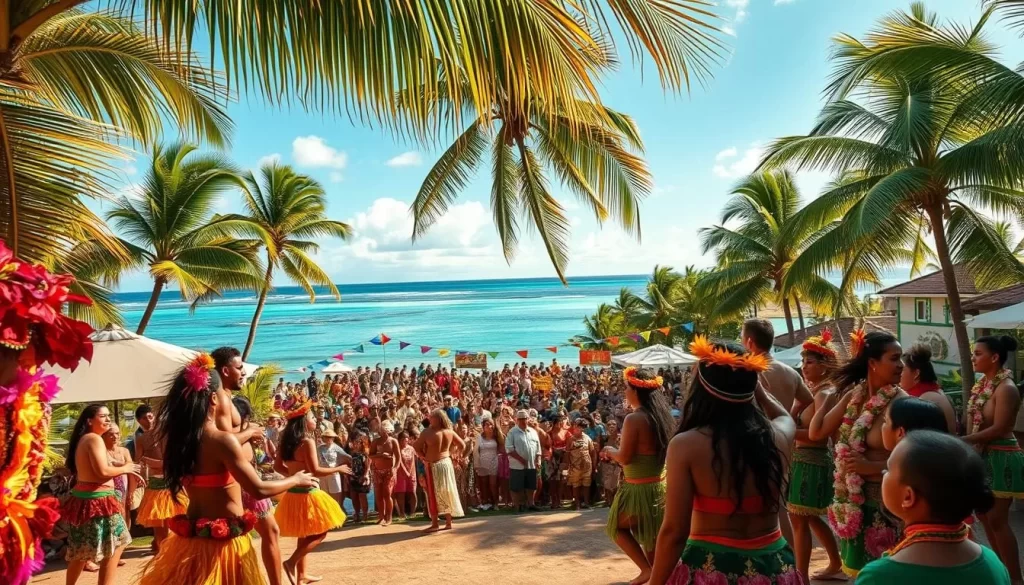
Traditional Food and Drinks at Fijian Festivals
When attending Fijian festivals, you will be treated to a diverse array of traditional foods that reflect the islands’ rich cultural heritage. The food stalls at these festivals offer a wide range of Fijian cuisine, showcasing the country’s multicultural influences.
Culinary Experiences Not to Miss
Fijian festivals are a feast for the senses, particularly when it comes to food. You can sample various traditional dishes, such as Kokoda, a refreshing raw fish dish marinated in lemon or lime juice, mixed with coconut milk, and garnished with vegetables.
Other must-try dishes include Palusami, made from taro leaves filled with coconut cream and onions, and Rourou, a taro-based dish cooked with coconut milk. Don’t miss out on the traditional Fijian feast cooked in an underground oven called a lovo, where meats, fish, and vegetables are slow-cooked to perfection.
| Traditional Dish | Description | Festival Experience |
|---|---|---|
| Kokoda | Raw fish marinated in lemon or lime juice, mixed with coconut milk | Refreshing and popular during outdoor festivities |
| Palusami | Taro leaves filled with coconut cream and onions | Showcases local ingredients and traditional cooking methods |
| Lovo | Meats, fish, and vegetables slow-cooked in an underground oven | Unique flavor and tender dishes typically prepared for special occasions |
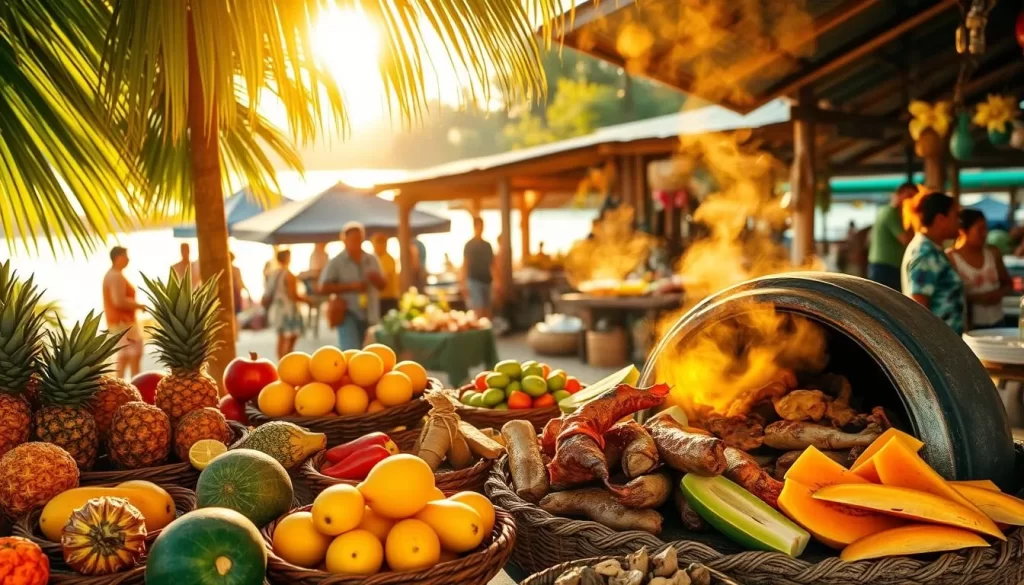
You can also experience the local cuisine at the food stalls, which offer a variety of traditional Fijian dishes, including dishes like cassava cake and coconut macaroons. The festivals provide an excellent opportunity to taste the local food and experience the cultural significance behind certain dishes.
Festival Etiquette: Tips for Respectful Participation
Fiji’s festivals offer a unique cultural experience, and being mindful of festival etiquette will enhance your visit. Understanding and respecting local customs is essential to fully appreciate the rich cultural heritage of Fiji.
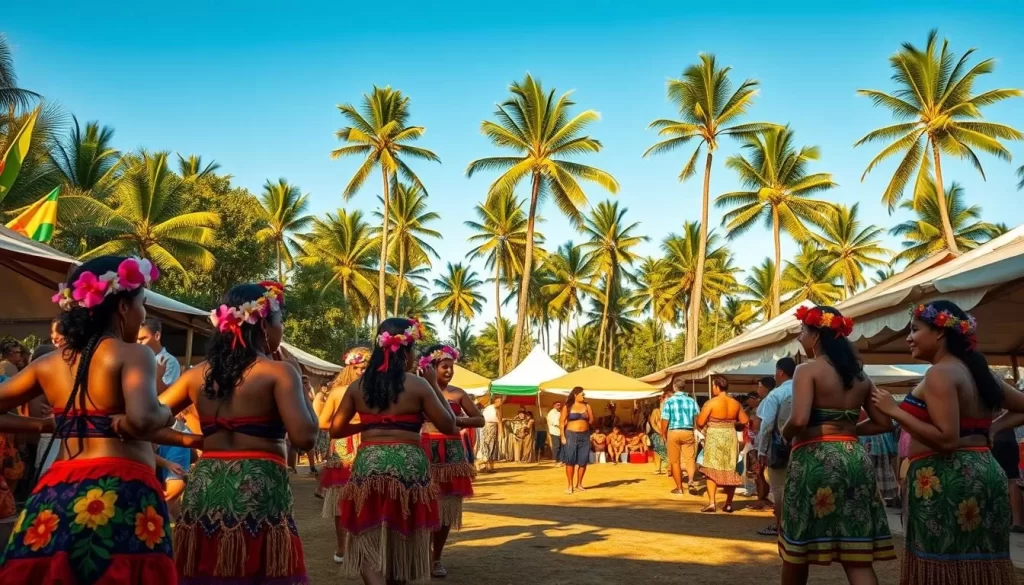
Cultural Norms to Observe During Celebrations
To ensure a positive experience for both you and the locals, it’s crucial to be aware of certain do’s and don’ts. When participating in Fijian festivals, respect for local traditions is paramount. This includes dressing modestly, especially for religious celebrations like Diwali, and being mindful of your behavior during ceremonies.
- Participate respectfully by engaging in activities and celebrating with locals, but do so with sensitivity towards the traditions involved.
- Always ask for permission before taking photos of people, particularly during traditional ceremonies or performances.
- Be aware of and follow local customs, such as removing your shoes before entering certain spaces or accepting food and drink with both hands.
- Understand that some festival activities may have gender-specific roles or areas, and observing these distinctions shows respect for traditional practices.
By being respectful and considerate of Fijian culture and customs, you can have a more meaningful and enjoyable experience during your visit. This not only enhances your own experience but also contributes to a positive interaction between you and the locals.
Conclusion: Embracing Fiji Through Its Festivals
Experiencing Fiji’s festivals firsthand is a great way to connect with the island’s history, traditions, and people. By participating in these vibrant celebrations, you can transform your trip into a meaningful cultural journey.
As you’ve learned, Fiji’s festivals offer more than just entertainment; they provide a window into the soul of this island nation. Whether it’s the Bula Festival, Hibiscus Festival, or Diwali, each celebration offers unique insights into Fijian identity and traditions.
To make the most of your cultural journey, consider the following: plan your visit around one or more of these festivals, approach cultural experiences with respect and curiosity, and be open to genuine exchanges with the locals. Even if you can’t attend a major festival, many resorts and villages offer cultural nights or experiences that draw from festival traditions.
By embracing Fijian cultural norms and participating enthusiastically in the island’s festivals, you’ll create lasting memories and gain a deeper understanding of the island’s culture and people. Your time in Fiji will be enriched by the rich cultural heritage and warm hospitality of the locals.
The above is subject to change.
Check back often to TRAVEL.COM for the latest travel tips and deals.
